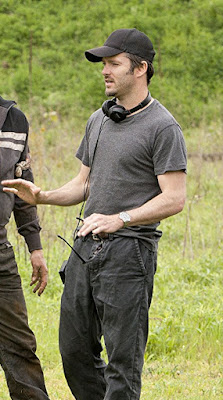Or maybe last year's, as HOSTILES, the new movie from Scott Cooper, was released in limited fashion on December 22, in the rather ridiculous hopes of becoming an Oscar contender. "Fart" film, for those new to this site, is TrustMovies' special name for a failed art film, and few I've sat through in the past 12, maybe 24, months, have failed on the level that this one does. Oh, its themes and intentions are all good -- pointing up unfairness of the treatment of our Native Americans, while allowing that, yes, some of them, did some pretty nasty things to those white settlers.
Unfortunately, filmmaker Cooper (shown at right), who both wrote and directed the film (after giving us, also in the writer-director category, Crazy Heart and Out of the Furnace), is a fellow who insists on making certain we get the point. Every single last lick of it. Over and over. And as slowly as possible so that it has to SINK IN. Lasting two hours fourteen minutes, Hostiles may seem to you, as it did to me (and others in our audience) about as slow-paced a movie as you'll have so far seen. At one point in the theater, a patron near me asked, and very loudly, "When it something gonna happen here?!" This was followed by several voices adding, "Yeah!" and "Right!" I tend to keep quiet most of the time in movie theaters, but I must say I could not blame them. Though in all fairness, the movie does begin with an action scene, as a family of white settlers is summarily massacred by a group of wild Indians, with only the wife (the always excellent Rosamund Pike, shown below) barely surviving.
If you maybe feel that this rather oddball situation smacks of heavy-handed manipulation -- does it ever! -- just wait. Along the journey, Bale and his crew discover Pike, in mourning for her own family, and of course they must bring her with them. Their journey is fraught with a couple more Indian attacks, but mostly it is burdened with a whole bunch of angst on Bale's part. And while this actor is often particularly good with angst, here the stuff is piled on so hot and heavy that it drags the film consistently downwards. The screenplay, dialog and the visuals are as heavy-handed as the themes, and this tends to make even those few scenes that resonate emotionally hit you over the head so hard you'll want to run for cover.
At least half the film's "moments" last far too long, as well, so that you're muttering throughout, "We get it, we get it." Robert Aldrich and Alan Sharp, in their excellent Ulzana's Raid from 1972, managed much of these same ideas so much better and stronger. Plus, their movie is a half-hour shorter. If you know that film, it will make sitting through this one all the more difficult. Finally, it is Hostiles' undue length, resulting in a kind of constant, overweening pomposity, that most thoroughly does it in.
Yes, indeed, as the poster at top declares, We are all... HOSTILES, in yet another example of "we-insist-that-you-fully-understand-this-idea" mode. And the movie does finally bring whites and redskins together at last (while killing most of them in the process). But if, considering all that has now been done to the Native American population, you can actually buy the sweet/sad finale without wincing, you're a better man I am, Gunga Din.
From Entertainment Studios Motions Pictures, the movie has now opened in a number of cities around the country. Click here to find the theater(s) nearest you.






















































